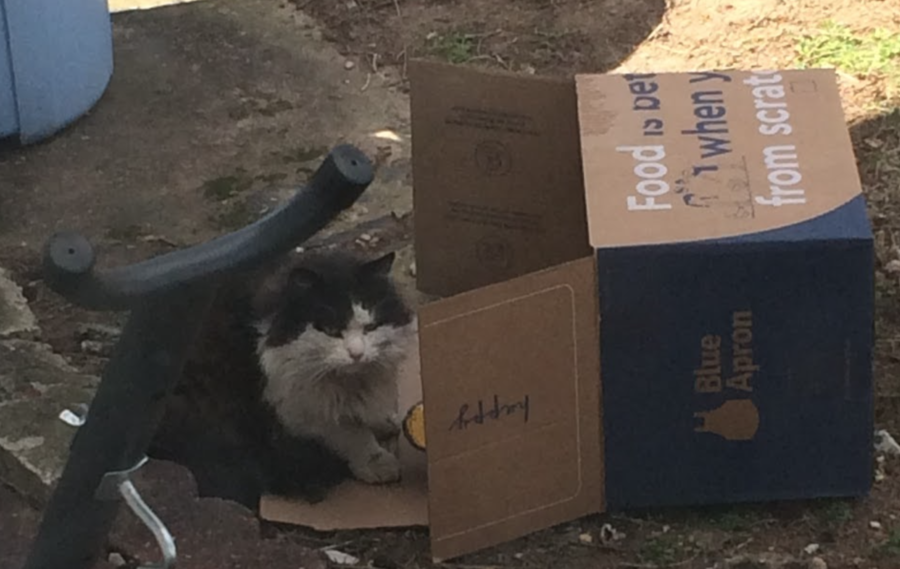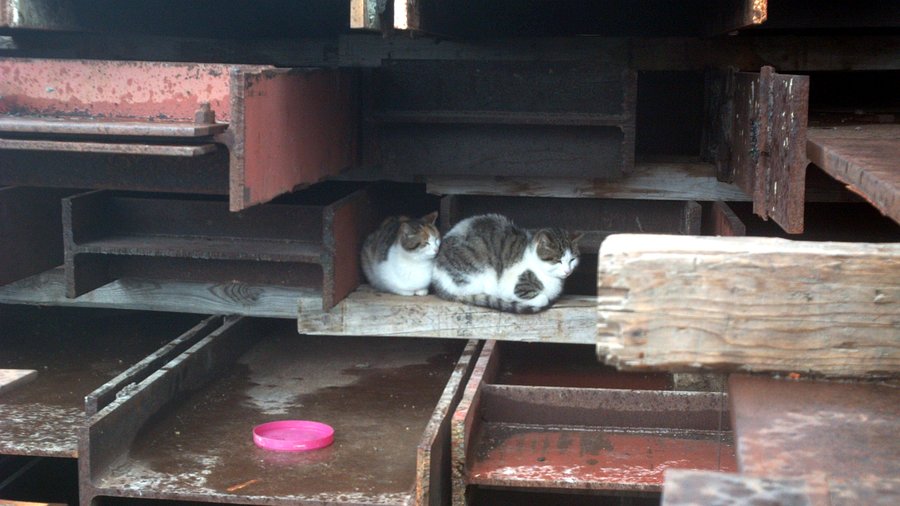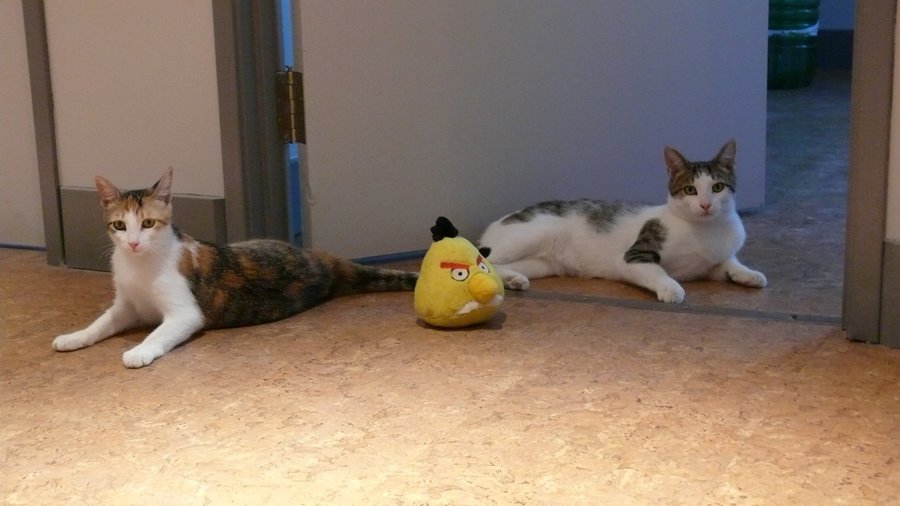- Joined
- Mar 18, 2017
- Messages
- 40
- Purraise
- 9
Hi all! So, I'm a huge softie and when I noticed a feral hanging around my property a few weeks ago, I quickly started leaving food out for him... well, naturally I began to get attached, not least of which because he was a huge fluffy thing with an incredible 'singing voice' - though he was very shy of people, to the point of not letting us approach, we'd often hear him let out a string of high-pitched meows somewhere near our property. Here's a picture of him.
Easy to see why I decided to call him Panda Bear!
Anyway, one thing led to another and I trapped him and got him neutered with the help of a very friendly local TNR volunteer. He seems fairly young, maybe a couple years at most (his teeth are PERFECTLY white), and they encouraged me to try and socialize him to some extent, and, even knowing it would be a bit of a long shot, I decided to give it a try. We have some brutal winters here, and I'd rather see this guy leading some kind of stable life indoors, rather than being at the mercy of the elements. Plus, I'm fond of the songbirds in my backyard...
Anyway, he's been neutered and is currently in a large dog crate loaned to me by the TNR volunteer, with a soft blanket, litter box, and an upturned plastic milk crate to shelter in. I have sheets covering the sides, though not the front entrance, although during the day I'll often peel up one of the other sides as well. I've had him for about a week now and have been following these guidelines: http://bestfriends.org/resources/socializing-cats-how-socialize-very-shy-or-fearful-cat. We're up to petting with the brush.
He's become less fearful. He will eat and groom in front of me. Sometimes he'll take chicken from my hand if I'm very slow and careful and get down really low (to the point of lying down as I reach in). Often he'll eat it if I drop or toss it. If I put in a stick or other, he usually doesn't hiss at it, but will sniff it (in the first couple of days he was totally non-responsive). An extended hand will usually get a hiss or even a swipe - I've miscalculated distances a couple of times and come away with a scratch while replacing dishes or trying to offer him chicken. He also had some URI after the surgery and one of his eyes has been leaking a lot of puss. He's on antibiotics, and will endure me cleaning out his eye with a sort of giant stick Q-tip that I made with paper towels. It was gummed shut yesterday, for example, but after about ten minutes of cleaning he was able to open it again. It's hard to know what's going on with him when he lets me do this stuff... he is usually quite still, and I hope he's not just frozen with terror. Sometimes he'll turn to face the wall of his tiny milk crate or do something else that seems to indicate he's not thrilled, and in that case I'll always back off.
In the last three days or so, now that he's become less fearful, he's taking to meowing plaintively at night, usually at least twice - sometimes I'll get out of bed, turn on a low light, and sit by him and quietly read to him to get him to stop. I'm not sure if it comforts him - perhaps it just makes him quiet down because he's a bit apprehensive. Today he started up meowing again, this time during the day. Basically it sounds like he's begging to get out... very sad. At the same time, I'd like to continue with the cage for at least another week to try and make more progress with socializing before letting him loose in the bedroom.
Ultimately, if he's miserable indoors and can't adjust to us, we'll set him free again, and build him a winter shelter. I'll keep up taking care of him outside and try and get a bell on him somehow to give the birds a bit more of a chance. But I'd also like to make this work - a neighbor who adopted ferals but let them roam lost them both to car accidents, and I'd rather Panda live a long life. I'd also like the chance to bond with him. I've got welding gloves coming today that will make things a little easier, I hope - I don't really have the confidence yet to escalate from the brush on a stick to the brush-with-touching phase in the guidelines with bare hands.
Basically, any guidance or advice would be so very welcome... it's hard to hear him meowing so plaintively, although he did do it outside sometimes too, and it's discouraging to feel like I'm making meaningful progress one hour but to have him hissing at me the next. Any ideas, or experiences... I am happy to answer whatever questions might help you get a better read on the situation, too.
Thanks in advance!
Easy to see why I decided to call him Panda Bear!
Anyway, one thing led to another and I trapped him and got him neutered with the help of a very friendly local TNR volunteer. He seems fairly young, maybe a couple years at most (his teeth are PERFECTLY white), and they encouraged me to try and socialize him to some extent, and, even knowing it would be a bit of a long shot, I decided to give it a try. We have some brutal winters here, and I'd rather see this guy leading some kind of stable life indoors, rather than being at the mercy of the elements. Plus, I'm fond of the songbirds in my backyard...
Anyway, he's been neutered and is currently in a large dog crate loaned to me by the TNR volunteer, with a soft blanket, litter box, and an upturned plastic milk crate to shelter in. I have sheets covering the sides, though not the front entrance, although during the day I'll often peel up one of the other sides as well. I've had him for about a week now and have been following these guidelines: http://bestfriends.org/resources/socializing-cats-how-socialize-very-shy-or-fearful-cat. We're up to petting with the brush.
He's become less fearful. He will eat and groom in front of me. Sometimes he'll take chicken from my hand if I'm very slow and careful and get down really low (to the point of lying down as I reach in). Often he'll eat it if I drop or toss it. If I put in a stick or other, he usually doesn't hiss at it, but will sniff it (in the first couple of days he was totally non-responsive). An extended hand will usually get a hiss or even a swipe - I've miscalculated distances a couple of times and come away with a scratch while replacing dishes or trying to offer him chicken. He also had some URI after the surgery and one of his eyes has been leaking a lot of puss. He's on antibiotics, and will endure me cleaning out his eye with a sort of giant stick Q-tip that I made with paper towels. It was gummed shut yesterday, for example, but after about ten minutes of cleaning he was able to open it again. It's hard to know what's going on with him when he lets me do this stuff... he is usually quite still, and I hope he's not just frozen with terror. Sometimes he'll turn to face the wall of his tiny milk crate or do something else that seems to indicate he's not thrilled, and in that case I'll always back off.
In the last three days or so, now that he's become less fearful, he's taking to meowing plaintively at night, usually at least twice - sometimes I'll get out of bed, turn on a low light, and sit by him and quietly read to him to get him to stop. I'm not sure if it comforts him - perhaps it just makes him quiet down because he's a bit apprehensive. Today he started up meowing again, this time during the day. Basically it sounds like he's begging to get out... very sad. At the same time, I'd like to continue with the cage for at least another week to try and make more progress with socializing before letting him loose in the bedroom.
Ultimately, if he's miserable indoors and can't adjust to us, we'll set him free again, and build him a winter shelter. I'll keep up taking care of him outside and try and get a bell on him somehow to give the birds a bit more of a chance. But I'd also like to make this work - a neighbor who adopted ferals but let them roam lost them both to car accidents, and I'd rather Panda live a long life. I'd also like the chance to bond with him. I've got welding gloves coming today that will make things a little easier, I hope - I don't really have the confidence yet to escalate from the brush on a stick to the brush-with-touching phase in the guidelines with bare hands.
Basically, any guidance or advice would be so very welcome... it's hard to hear him meowing so plaintively, although he did do it outside sometimes too, and it's discouraging to feel like I'm making meaningful progress one hour but to have him hissing at me the next. Any ideas, or experiences... I am happy to answer whatever questions might help you get a better read on the situation, too.
Thanks in advance!








